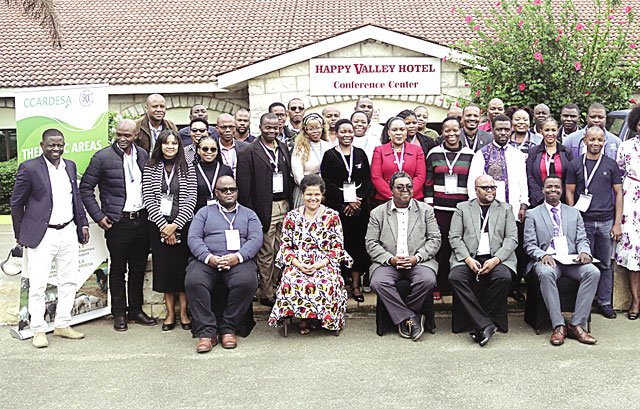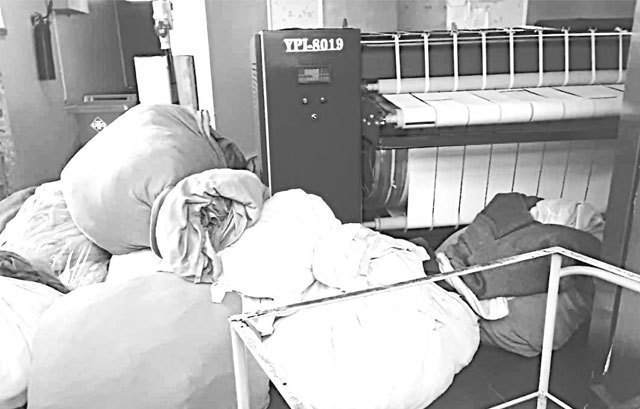By By Dessislava Choumelova EU Ambassador to Eswatini | 2021-10-14
THE evidence is clear. In August, the world’s scientists concluded once again that immediate action is needed. Climate change is uncomfortably close to all our daily realities no matter where in the world we live. It is triggering climate disasters across the world, putting the survival of many species at risk and soon rendering certain parts of the Earth uninhabitable to humans.
As climate scientist Prof. Kimberly Nicholas framed it; “It’s warming. It’s us. We’re sure. It’s bad. But we can fix it”. In Paris, five years ago, the international community finally agreed to embark upon an ambitious journey: to limit global warming to between 1.5 and 2°C. While such levels of warming might seem manageable, the difference could be existential.
For the human body the difference between 40 and 42°C is difference between life and death. Containing the temperature increase means limiting climate disruption and reducing the chance of natural disasters. Yet the news is not all grim - science also tells us that a zero-carbon society is possible – a society of new green jobs and growth that can limit warming to 1.5°C.
The European Union has already shown that it is feasible to decouple growth from CO2 emissions (since 1990, our GDP has grown by over 60 per cent while net greenhouse gas emissions have fallen by a quarter). In July we released our legislative package to implement the European Green Deal and deliver a 55 per cent net reduction in greenhouse gas emissions by 2030 on the path to climate neutrality by 2050. This transition of how we generate and use energy, move around, build & heat houses and use the land is designed in the fairest way possible, ensuring no one is left behind. Otherwise, it won’t work.
But obviously, the EU cannot manage alone as we only emit 8 per cent of global CO2 emissions. We have to inspire others - even the most reluctant partners - to join the path to climate neutrality. When the EU committed to climate neutrality by 2050 two years ago, few believed Japan, USA, South Korea and even China would follow.
When we launched the EU Green Deal, few imagined the EU would borrow for a green recovery to finance the most ambitious climate neutrality plan in the world. We set up the first Green Alliance for climate neutrality, starting with Japan on 27 May, and we pushed for the G7 to commit to climate neutrality in June. Now we are pushing the G20 to follow suit. And we will never stop pushing for progress.
Strengthen We invite all partners to strengthen their climate mitigation and adaptation plans. We are ready to offer technical and financial support, and are walking the talk with our own Climate law, 2030 package and Adaptation Strategy. We are among the world’s biggest providers of climate finance, releasing EUR 22 billion (USD 26 billion) in 2019 representing more than a third of the total effort by developed countries And we are committed to scaling up this amount further in the years to come, as can for instance be seen by European Commission President Von der Leyen’s recent announcement of an overall 4 billion top-up under the EU’s core budget over the 2021-2027 period.
But we need others to do more also to meet the commitment by developed countries to provide USD 100 billion per year for climate action in developing countries. Mobilising more private finance will also be important in this regard. The EU has fought hard to keep the Paris Agreement alive.
After the negotiating, the time for climate action is here. Each State must increase its ambition to cut global emissions, but the UNFCCC just released a disheartening report. Commitment Under current commitment, global temperature would rise by an unacceptable 2.7°C by 2100 – a gloomy outlook to say the least.
A lack of ambition means a climate tax will be levied by climate change itself, a tax that is bad for everyone, paid for with destruction, and without any upside for society. This is why we have proposed a flexible carbon border adjustment mechanism to use only if partners are not ambitious enough on climate action.
Putting a price on carbon is essential, one way or another. It is a proven way to the price signal that triggers change. We want to lead by example and engage with partners, but we are prepared to take more action, if necessary. If we close the gaps in financing and ambition, if all countries commit to doing more, then we can still keep the climate crisis under control. Based on science, realists today know the cost of inaction is immeasurable.
It’s a fantasy to believe we could afford not to act. We now need a systemic and exponential change away from fossil fuels. It is good for our health, our households, our crops, our water, our jobs and our economies. This will require the support of world leaders and pressure from citizens. Every action counts: how we vote, what we eat, how we travel. Just how damaging climate change will be is in our hands.
The EU strives to take a leading role in climate action, and we want to do even more with Eswatini, a country that has contributed little to global climate change impacts, but is disproportionally affected by its negative impacts. This is seen first-hand with drought, excessive rains, changes in temperatures that affect productivity and compromising the economic growth of the country.
Through its National Development Plan, Eswatini recognises that underpinning all development aspirations and economic recovery initiatives post covid-19, the most fundamental measure necessary to achieve the turnaround and stability is climate change resilience. It is crucial that climate change and environmental sustainability are mainstreamed in all programmes and certain sectors essential for growth are targeted, to achieve a ‘greener’ economy. These sectors include agriculture, water, energy, health and transport.
Since 2006, the EU Delegation in Eswatini has been implementing an agriculture portfolio that consists of support to the sugar sector, and since 2016 support to High Value Crops and Horticulture Projects including Water Harvesting Small and Medium Dams Project. Under these programmes, climate sensitive interventions are focused on water and energy saving as well as watershed management.
This is in line with the EU farm to fork strategy as encompassed in the green economy. Before of the end of the year, we will commence a programme that will boost the sustainable and inclusive development of key value chains in Eswatini via renewable energy and energy efficiency investments. The objective is to help improve Eswatini’s business environment in the renewable energy sector and increase the investments in renewable energy or energy efficiency projects. In the new Multi-annual Indicative Programme (2021-2027) between the EU and the Government of Eswatini, there will continue to be an important focus on the green economy which will include sustainable agriculture and energy.
Within sustainable agriculture area, support will be given towards improving agricultural production through sustainable farming including improvement of in-field irrigation management, adoption of climate smart agriculture technologies, specific focus on water and watershed management, sound management of land, soil conservation/protection and biodiversity. We have one planet and one mission as partners: to keep earth healthy for our children. Last week, the UN Human Rights Council declared access to a healthy environment a human right. But it is also a duty, for all of us.
Climate and environmental action can take place anywhere, at any level. It is up to every citizen. There is no time left for inaction - the time for practical solutions is now, from the most basic to the most innovative. And as partners, we will support and learn from each other, to the benefit of all Europeans and Emaswati, as we always have.
share story
Post Your Comments Below

Eswatini along with many other African nations is under scrutiny for failing to meet its commitme...

SOCCER - LIVING on borrowed time!
For the first time in history of local football, two of...

BEAUTY Pageant Eswatini Chairman, Sandra Ismail, officially passed over the Miss Eswatini title t...

While things are falling apart at the Pigg’s Peak Government Hospital, the ministry of heal...
All material © Swazi Observer. Material may not be published or reproduced in any form without prior written permission.
Design by Real Image Internet